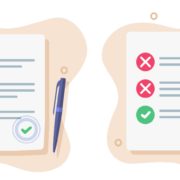MPRE Frequently Asked Questions (FAQs): Part 2
MPRE Frequently Asked Questions (FAQs): Part 2
The Multistate Professional Responsibility Examination (MPRE) tests the American Bar Association’s Model Rules of Professional Conduct, as well as caselaw, rules, and legal opinions that reflect majority law concerning the ethical rules that govern lawyers. Many exam takers have questions about what to expect, how to prepare, how the MPRE is scored, and so much more! Today, we thought we would put together another blog post with MPRE FAQs. This post is part two of our FAQ series—check out our first post with MPRE Frequently Asked Questions (FAQs) here!
MPRE Frequently Asked Questions (FAQs): Part 2
MPRE Generally
Who administers the MPRE?
The National Conference of Bar Examiners (NCBE) is responsible for drafting and scoring the exam.
How long is the MPRE exam?
The MPRE exam is two hours long. You will have 60 multiple-choice questions to answer in those two hours, which gives you approximately two minutes to answer each question.
What topics are tested and how frequently does each topic appear as a question on the MPRE?
The MPRE tests the following topics (with the percentage of exam questions in parenthesis):
- Conflicts of interest (12–18%)
- Litigation and other forms of advocacy (10–16%)
- Lawyer-client relations (10–16%)
- Competence, legal malpractice, and other civil liability (6–12%)
- Client confidentiality (6–12%)
- Regulation of the legal profession (6–12%)
- Different roles of a lawyer (4–10%)
- Communications about legal services (4–10%)
- Safekeeping funds and other property (2–8%)
- Transactions and communications with other persons (2–8%)
- Judicial conduct (2–8%)
- Lawyer’s duties to the public and legal system (2–4%)
If you are interested in learning more about how many questions will appear for each topic, check out this MPRE frequency chart!
How many answer choices does each exam question have?
For each multiple-choice question, you will select from four possible answer choices.
Is the MPRE closed book?
Yes, the MPRE is closed book. You will not be permitted to bring in any study materials.
How difficult is the MPRE?
Although it’s likely not the hardest exam you will ever take, it can be challenging for many students. You will still need to study and take the exam seriously to ensure that you pass. Read more about exactly how difficult the MPRE is here!
If, When, and How to Take the MPRE
Do I need to take the MPRE?
Most likely, yes. The MPRE is required for licensure to the bars of all but two U.S. jurisdictions: Wisconsin and Puerto Rico. Connecticut and New Jersey do not require bar applicants to take the MPRE if they have passed a professional responsibility course in law school.
Should I take the MPRE while still in law school?
Generally, yes. It is a good idea to take the MPRE right after you complete, or concurrent with taking, your law school’s professional responsibility course (or its equivalent). Most students take this course during their 2L year or the beginning of their 3L year. Read this post for more about when to sit for the MPRE!
Can I take the MPRE after I take the bar exam?
Most states do not mandate that you pass the MPRE before you take the bar exam. However, some jurisdictions do not allow you to take the bar exam (or only allow you to take the bar exam once or twice) if you do not have a passing MPRE score. And, as noted above, many bar applicants find it helpful to take the MPRE around the same time as their law school professional responsibility course. Either way, be sure to check with your jurisdiction’s specific rules on whether you can take the MPRE before the bar exam!
Can I take the MPRE online?
Yes, you can take the MPRE online. The MPRE is administered online at Pearson VUE testing centers.
How do I register for the MPRE?
There are a few steps you must follow in order to register for the MPRE:
- Step 1: Create a National Conference of Bar Examiners (NCBE) account if you do not already have one.
- Step 2: Apply for MPRE test accomodations, if applicable.
- Step 3: In your NCBE account, select “MPRE Registration” and follow the instructions to complete the NCBE portion of the MPRE registration process.
- Step 4: Within 24 hours of completing Step 3, you will receive an “Authorization to Test” email from Pearson VUE.
- Step 5: Within 48 hours of receiving the “Authorization to Test” email from Pearson VUE, and no later than the registration deadline, schedule an appointment to test with and pay the test fee to Pearson VUE according to the instructions set forth in the “Authorization to Test” email.
- Step 6: You will receive two confirmation emails from Pearson VUE—one for the exam appointment and one for payment.
When do I apply for MPRE test accommodations?
You must request MPRE test accommodations from the NCBE prior to registering for the MPRE. For more information about test accomodations, visit the NCBE website.
Is there a strict deadline to register for the MPRE?
Yes, the NCBE makes it clear that absolutely no registrations are accepted after 11:59 PM central time on the registration deadline. For registration deadlines for upcoming administrations, check the NCBE website.
Can you reschedule the MPRE?
Yes, the MPRE can be rescheduled. If it is at least 48 hours prior to the scheduled appointment, you can change the date or testing center location for the same test administration for which you originally registered in your online Pearson VUE account or by telephone. You must, however, pay a non-refundable and non-transferable $25 fee for rescheduling the MPRE.
Studying for the MPRE
How much should I study for the MPRE?
The short answer is yes! Although most consider the MPRE to be much easier than the bar exam, about one in four test-takers fail. Studying for the appropriate amount of time, however, helps ensure that you are one of the test-takers that passes. We find most takers study for two weeks or less, but you will be at an advantage if you set aside about a month to study.
Should I take an MPRE course?
Yes, we recommend that you take an MPRE course. Many companies offer MPRE courses for free. We have a free MPRE course for you, which is rated five stars and trusted by thousands of test-takers. We also offer a free MPRE guide! Check out this post with four reasons why you need an MPRE course.
Are Barbri’s MPRE practice questions harder than the actual MPRE?
Generally speaking, no. Some test takers insist that Barbri MPRE questions are the best to use to prepare for the MPRE because they are harder than the actual MPRE. However, the best practice questions to both help a student prepare for the exam and to indicate a student’s ability to pass are actual, released MPRE questions. Click here to learn about where to find the best, real MPRE questions, including actual, released MPRE questions available through JD Advising!
Are Kaplan’s MPRE practice questions harder than the actual MPRE?
Same answer as above!
Is there anything that I can do on test day to boost my MPRE score?
There are a few ways that you can boost your MPRE score on test day:
- Pay close attention to the call of the question.
- Go back to the facts if you are stuck between two possible answers.
- If you are unsure of an answer, eliminate wrong answer choices rather than outright guessing.
- Answer every question (you do not lose points for wrong answers, but you will not get credit for a blank answer!).
- Keep close track of time.
Exam Day
Do I need to bring ID with me?
Yes, you will need to bring to the MPRE two forms of identification—primary and secondary. Primary ID typically must be government-issued and includes passports, driver’s licenses, military IDs, or green cards, whereas secondary ID does not have to be government-issued and may include school IDs, credit cards, or library cards.
What can I bring into the testing center?
You are only allowed to take your primary ID and “comfort aids” into the testing room. The testing center will have small lockers for personal items, but you cannot access any of the materials in your locker during the test.
If I am taking the test in person, when do I have to arrive?
You want to arrive at the Pearson VUE testing center at least 30 minutes before your scheduled time. If you get there less than 15 minutes before your assigned time, there is a risk that you will not be allowed to take the exam. As the test itself is two hours, you should plan on being at the testing center for about 2 ½ to 3 hours.
How many breaks will I get during the exam?
None. There are no scheduled breaks during the MPRE. If you need to take an unscheduled break—for example, to stand and stretch or to use the restroom—you must raise your hand and wait for permission/instructions. However, your test time will not stop.
What if something goes wrong during the exam?
If something goes wrong, you can raise your hand to get the attention of the proctor. Remember, however, that the proctor will not be able to answer any specific questions about exam material. You also have the option of filing a formal complaint after the exam ends, which must be received in writing by NCBE within 6 days of your test date.
MPRE Scoring
How are MPRE scores calculated?
You receive credit for every question you answer correctly on the MPRE. You do not lose points for incorrect answers. So, you should answer every question! Out of the 60 MPRE questions given to you on test day, only 50 are scored, and the remaining 10 questions are experimental questions. Read more about MPRE scoring here!
What score do I need to pass the MPRE?
Depending on the jurisdictions, a score between 75 and 86 is required to pass the MPRE. For example, in order to be sworn in as an attorney to practice in Michigan, you need to score an 85 or higher on the MPRE, whereas in Georgia, you only need the score of a 75 to pass. If you are wondering what score your state requires, check out this chart of passing MPRE scores by jurisdiction.
Are MPRE scores public?
No, MPRE scores are not public. Your MPRE score results will appear in the NCBE Account File Cabinet when you log into your account on the NCBE website. To share your score with a jurisdiction, you must request an MPRE Score Report via MPRE Score Services and indicate which jurisdiction(s) that the NCBE should report the score to.
When are MPRE scores released?
The NCBE states that scores are released within five weeks of the exam, but we’ve found it typically does not take that long to get your MPRE results. Instead, it seems that scores are typically released approximately one month after the examination date.
Can you transfer your MPRE score?
If you wish to have your MPRE score transferred or reported to a jurisdiction other than the one you originally designated, you can submit an MPRE Score Report request in your NCBE account for a $25 fee.
How long do MPRE scores remain valid?
The NCBE performs score services for MPRE scores earned beginning in 1999 and later.
Each jurisdiction sets its own policy for how long MPRE scores remain valid. Check your jurisdiction’s specific rules on the maximum age for MPRE scores.
Looking to Ace the MPRE?
- Enroll in our 5-star rated free MPRE Course, complete with expert guidance, an exclusive outline, practice questions, and a one-sheet.
- Tackle the Real MPRE questions — the gold standard for test preparation.
- Elevate your preparation with personalized MPRE private tutoring, featuring a tailored study plan and dedicated MPRE outline.
- Dive into our assortment of complimentary top-notch MPRE resources for your success.











Leave a Reply
Want to join the discussion?Feel free to contribute!